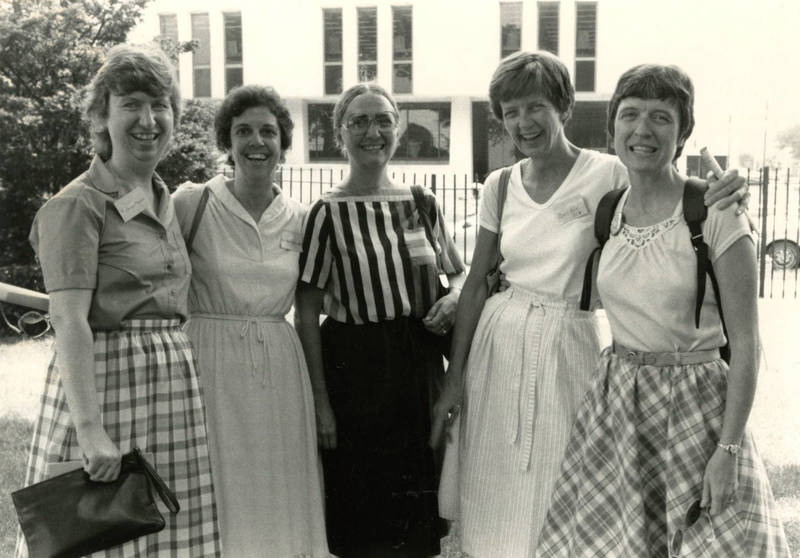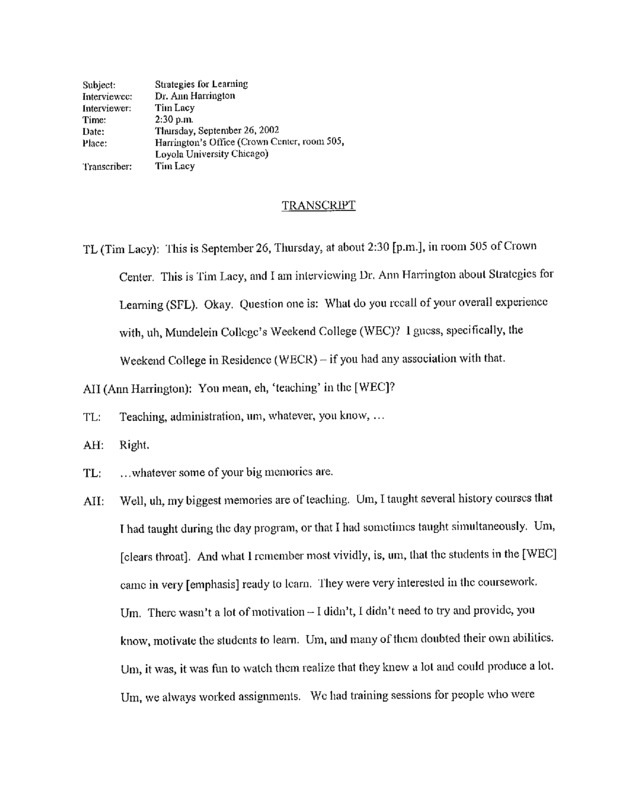Sister Ann Harrington, BVM, Interview with Tim Lacy, 2002
Item
Title
Sister Ann Harrington, BVM, Interview with Tim Lacy, 2002
Summary
Sister Ann Harrington, BVM discusses her experiences as a professor for the Mundelein College Weekend College during the 1970s. Sister Ann took part in a special program called “Strategies for Learning” which utilized pedagogical methods such as “Autobiography” and a “How to Read a Book.” The program used books such as How to Read a Book by Mortimer Adler, and Sigmund Freud’s Civilization and Its Discontents. Sister Ann concludes her interview by discussing the effects of the Loyola-Mundelein affiliation on the Mundelein Weekend College. She notes that the affiliation weakened the community bonds among the students of the Weekend College which led to its eventual demise.
Date Created
2002
Biography
Sister Ann Harrington, BVM is a Loyola University Chicago Professor of History Emerita. Sister Ann graduated from Mundelein College and returned there to teach French and History and also served in the faculty of the Weekend College. Sister Ann specializes in the history of Japan and East Asia, and is the author of Expanding Horizons: Sisters of Charity of the Blessed Virgin Mary, 1919-1943, a history of the BVM order.
Time Log
Sister Ann Harrington, BVM
Interview with Tim Lacy, September 26, 2002
Chicago, IL
Time Log
Side A
0-5 minutes
Tim Lacy, Interviewer
Introductions.
This interview is about strategies for learning at Mundelein College and experiences with teaching and administration at the Weekend College.
Students were motivated and gained confidence. Had training sessions for teachers conducted by Mary Griffin and Bill Hill. The classes only met every other week for a ten-week session. The weekend students outperformed the day students. Professor Harrington started at Mundelein in 1969. The Weekend College began between 1972-1975.
5-10 minutes
Harrington taught “Core Strategies for Learning.”
Most Weekend College students were women.
Many adult students needed to review strategies for approaching a book. Used Mortimer Adler’s How to Read a Book and Sigmund Freud’s Civilization and its Discontents.
10-15 minutes
Harrington reflects on: Attendance at a Northeastern University, the Equal Rights Amendment and a visit from Phyllis Schlafly.
Describes her efforts to teach critical thinking and with the Adler “How to Read a Book” method.
15-20 minutes
Harrington describes the “Autobiography” strategy for learning which proved helpful for advisors and faculty members. Also depicts a learning module in which the students created a plan for themselves after the Weekend College.
20-25 minutes
The Loyola administration tried to keep the Weekend College for a few years after the affiliation with Loyola. However, it was difficult to maintain “Weekend College” community bonds. The Weekend College provided vital support for the students. Watching Loyola dismiss the kind of “community learning” that helped adult learners was difficult.
Interview with Tim Lacy, September 26, 2002
Chicago, IL
Time Log
Side A
0-5 minutes
Tim Lacy, Interviewer
Introductions.
This interview is about strategies for learning at Mundelein College and experiences with teaching and administration at the Weekend College.
Students were motivated and gained confidence. Had training sessions for teachers conducted by Mary Griffin and Bill Hill. The classes only met every other week for a ten-week session. The weekend students outperformed the day students. Professor Harrington started at Mundelein in 1969. The Weekend College began between 1972-1975.
5-10 minutes
Harrington taught “Core Strategies for Learning.”
Most Weekend College students were women.
Many adult students needed to review strategies for approaching a book. Used Mortimer Adler’s How to Read a Book and Sigmund Freud’s Civilization and its Discontents.
10-15 minutes
Harrington reflects on: Attendance at a Northeastern University, the Equal Rights Amendment and a visit from Phyllis Schlafly.
Describes her efforts to teach critical thinking and with the Adler “How to Read a Book” method.
15-20 minutes
Harrington describes the “Autobiography” strategy for learning which proved helpful for advisors and faculty members. Also depicts a learning module in which the students created a plan for themselves after the Weekend College.
20-25 minutes
The Loyola administration tried to keep the Weekend College for a few years after the affiliation with Loyola. However, it was difficult to maintain “Weekend College” community bonds. The Weekend College provided vital support for the students. Watching Loyola dismiss the kind of “community learning” that helped adult learners was difficult.
Index
Ann Harrington 2002 Index
KEY
AH2002= Ann Harrington 2002 Interview
INDEX
Adler, Mortimer, How to Read a Book, AH2002 A 5-10
Adult learners, AH2002 A 20-25
Autobiography Strategy for Learning, AH2002 A 15-20
Community bonds, AH2002 A 20-25
Community learning, AH2002 A 20-25
Core Strategies for Learning, AH2002 A 0-5, AH2002 A 5-10
Equal Rights Amendment, AH2002 A 10-15
Freud, Sigmund, Civilization and Its Discontents, AH2002 A 5-10
Griffin, Mary, AH2002 A 0-5
Hill, William, AH2002 A 0-5
Mundelein/ Loyola Affiliation, AH2002 A 20-25
Mundelein Day Students, AH2002 A 0-5
Mundelein Weekend Students, AH2002 A 0-5
Northeastern University, AH2002 A 10-15
Phyllis Schlafly, AH2002 A 10-15
Weekend College, AH2002 A 0-5, AH2002 A 15-20, AH2002 A 20-25
KEY
AH2002= Ann Harrington 2002 Interview
INDEX
Adler, Mortimer, How to Read a Book, AH2002 A 5-10
Adult learners, AH2002 A 20-25
Autobiography Strategy for Learning, AH2002 A 15-20
Community bonds, AH2002 A 20-25
Community learning, AH2002 A 20-25
Core Strategies for Learning, AH2002 A 0-5, AH2002 A 5-10
Equal Rights Amendment, AH2002 A 10-15
Freud, Sigmund, Civilization and Its Discontents, AH2002 A 5-10
Griffin, Mary, AH2002 A 0-5
Hill, William, AH2002 A 0-5
Mundelein/ Loyola Affiliation, AH2002 A 20-25
Mundelein Day Students, AH2002 A 0-5
Mundelein Weekend Students, AH2002 A 0-5
Northeastern University, AH2002 A 10-15
Phyllis Schlafly, AH2002 A 10-15
Weekend College, AH2002 A 0-5, AH2002 A 15-20, AH2002 A 20-25
Copyright
The materials contained on this portal are freely available for scholarship, or non-commercial research under the “fair use” provisions of US copyright law. Prior written permission is required for any use that exceeds “fair use” including publication, broadcast, for placing on another web site, or for any paid or commercial use.


